10 Natural Ways to Repel Rascally Rabbits to Protect Your Yard and Garden
As adorable as these creatures are, rabbits can wreak havoc on lawns and gardens. Garden centers, home improvement stores, and online resources offer commercial products to help gardeners protect their plants from rabbits. But here’s the problem: commercial repellents are expensive, stink, and some contain chemicals that can pose health hazards to pets.
The solution is to find cheaper options that are effective in getting rid of rabbits that are ruining your lawn and garden.
Rabbit repellents work in two ways to keep rabbits out of your flower and vegetable garden and off the lawn: They produce 1) a smell or 2) a taste that is repulsive for rabbits but without harm. Even better, perhaps, homemade repellents are not only less expensive but offer safe alternatives to commercial repellents.
How to Identify Rabbits in Your Garden
Of the nine species of North American cottontail rabbits, the eastern cottontail (Sylvilagus floridanus) is our most abundant and annoying. Found all the way from Boston to Boulder and south into Mexico, this bunny-about-town is rarely found in forests, preferring instead brushy fence rows, field edges, brush piles, and—how do I know this?—landscaped backyards! Its fondness for flowers, vegetables, bark, and bulbs often results in pruned and clipped gardens and lawns
Even though its nicknames are adorable ( bunny, bunny rabbit, cottontail), the eastern cottontail can be a bothersome pest. It is gray or brownish, with a short tail and big ears. It can weigh 2 to 4 pounds and be 15 to 19 inches in length with a lifespan of 12 to 15 months.
For an eastern cottontail, security is a pile of brush and leaves under my concrete porch floor or another animal’s abandoned burrow. Unlike their European cousins, these rabbits do not dig intricate burrows or “warrens” but make do with what they find.
Rabbits rarely leave their shelters in broad daylight, preferring instead early morning or evening. Like most animals, they are sensitive to the change in day length as spring approaches. For rabbits, the longer days signal the start of two things: spring dining and breeding season.
Speaking of breeding, rabbits naturally have a high reproductive potential. Depending on their region of origin, they can produce about three litters of six kittens. The gestation period for rabbits is just 29 days!
1. Original Irish Spring bar soap
I was surprised to learn that the original Irish Spring bar soap is an inexpensive way to get rid of rabbits. Apparently, to rabbits and other critters (even deer, so I have heard), it has a terrible stench that drives them away.
To turn Irish Spring into an effective repellent, you’ll need these supplies that are readily available in local stores or online:
- Irish Spring bar soap
- Small fabric drawstring bags OR cheesecloth and string
- Wooden stakes (12-by-1-by-1 inches or similar)
- Staple gun or duct tape
Using a sharp knife, carefully slice the Irish Spring soap bar(s) into 1/2-inch cubes. These do not have to be exact, but you’ll want many small chunks to treat your entire garden.
Drop two pieces of soap into each drawstring pouch, pull the strings tightly to close, and tie the strings tightly to secure the soap inside. Alternatively, wrap two pieces of soap in cheesecloth, gathering it into a pouch and securing it with string.
Staple or securely tape one pouch to the end of each wooden stake. Drive the opposite end of each stake 6 inches into the ground around your lawn and garden, spacing them from 5 to 10 feet apart. Place stakes closer together in areas with thick vegetation or in spots you’ve noticed often are damaged by rabbits or other animals.
Alternatively, lay the drawstring pouches under and around the vegetation for a more discrete solution.
Monitor the garden or lawn over the course of the next week for signs of damaged or eaten plants. The amount of Irish Spring soap you need to ward off pests depends on the size of your garden and the population of local deer, rabbits, and other animals. Be prepared to add more stakes to target heavily trafficked areas.
Irish Spring soap repels mammal pests, such as mice, rabbits, and deer. It does not repel insect pests, and it does not always eliminate pests completely. However, many have reported excellent results—and I am one. If you’re looking for an effective way to send rabbits away, it’s certainly worth a shot.
2. Household ammonia
Rabbits are dinner for predator animals, so they must be aware of what and who is around them for their survival.
Ammonia is a naturally occurring gas that is a building block for a range of cleaning supplies. The scent of ammonia is similar to the smell of urine that rabbits perceive their predators have used to mark their territory. When rabbits smell the ammonia, they are compelled to move on to another area to avoid whatever animal left its mark behind.
Because of its strong smell, similar to urine, ordinary household ammonia straight out of the bottle makes a great rabbit repellent. You don’t need to figure out complicated formulas or mix a bunch of different ingredients to keep rabbits away.
Household ammonia, located in the cleaning or laundry section of stores or online, will do the trick when used at full strength to get rid of rabbits. That makes it a good choice for gardeners who want a simple, natural solution for their rabbit problem.
Soak strips of old rags in undiluted ammonia, and place them on the trails the rabbits are using to get into your garden. The rags will hold the scent and make life unpleasant for the bunnies.
If you have outdoor pets, you may want to consider options other than ammonia, as some professionals suggest it may be harmful if ingested by curious pets with a weak sense of smell.
3. Garlic hot pepper repellant
Homemade rabbit repellent is a cheap way to keep critters out of your garden. It requires a bit more effort than commercial products, but the ingredients are easy to find and generally inexpensive.
- 1 tablespoon crushed red pepper flakes OR cayenne powder
- 1 tablespoon dish soap
- 5 garlic cloves, crushed
- Water
- Empty gallon-size container with lid
Peel garlic cloves, smash them, and drop them into a gallon jug. Add dish soap and crushed red pepper flakes or powder. Fill the jug with water and apply the lid. Shake the container to mix the ingredients.
Place the jug in the sun for two days to steep, making sure the water becomes entirely concentrated with the ingredients. Strain through a fine sieve or coffee filter. Dispense using a spray bottle or garden sprayer and apply to plants and areas targeted by rabbits. Reapply every five days.
It will take several weeks to begin seeing results. In case of heavy rain, reapply as soon as the weather clears to ensure that your repellant efforts remain effective.
4. Blood meal, bone meal
Placing blood meal or bone meal (find both in garden centers or online) around plants and along paths has shown some efficacy in controlling rascally rabbits. They find the smell of these products to be repulsive.
As a bonus, both are excellent fertilizers, so your garden will also benefit from this “repellant.”
ATTENTION PET OWNERS
Blood Meal is toxic to cats, and perhaps other pets. Please do your own independent research for your particular pet(s) before attempting blood meal as a deterrent for yard and garden pests.
5. Red pepper powder
Sprinkling dry red pepper powder at the base of plants can protect them from hungry rabbits. You’ll want to find a source that sells it in bulk, such as 1 pound or 3 pounds.
6. Strategic planting
There are ways to repel rabbits from gardens altogether. In fact, certain plants can do the trick. Plants like nasturtiums, garlic, onion, rhubarb, oregano, basil, and geranium are effective at keeping rabbits out of garden beds.
Lavender, snapdragons, and lilac bushes discourage rabbits, and it might be better to look at them and provide fragrance than the other options.
7. Vinegar and corn cobs
Another effective method is soaking corn cobs in plain distilled white vinegar and strategically placing them around your garden to deter rabbits.
Remember to re-soak the corn cobs in vinegar every two weeks for continual efficacy.
8. Motion sprinklers
Thanks to advancing technology, we now have motion-activated water sprinklers designed to deter rabbits and protect gardens from their intrusion.
These automated sprinklers have sensors so that when a rabbit comes into the sensor range, it is activated to harmlessly spray the little critter.
Additionally, sound-emitting sprinklers that function similarly to traditional water sprinklers and can be conveniently installed are available. These motion-activated sprinklers are eco-friendly and readily available for purchase at hardware stores or online retailers.
9. Put up a fence
The best way to stop rabbits from entering your yard is to use physical prevention methods like fencing. Install a strong barrier, such as a chicken wire fence, to stop rabbits and their babies from getting into your yard. It needs to be at least 4 feet high, as rabbits can climb, and they will. Rabbits can also dig, so the mesh or wire grid you select needs to go down into the ground by at least a few inches.
While fencing may be the most labor-intensive option, it will also be the most effective and long-lasting!
10. Get a cat
The presence of dogs and cats will do a good job of pest control. If you have them, let them spend at least part of the day in the garden area. And if your yard is big enough, you might get a cat just to take care of any mice and to keep rabbits away.
In closing
Remember, when embarking on a campaign to get rid of rabbits, give all methods and or products time to work before giving up on them!
EverydayCheapskate™ is reader-supported. We participate in the Amazon Services LLC Associates Program and other affiliate advertising programs, designed to provide a means for us to earn from qualifying purchases, at no cost to you.
More from Everyday Cheapskate
Please keep your comments positive, encouraging, helpful, brief,
and on-topic in keeping with EC Commenting Guidelines
Last update on 2024-04-20 / Affiliate links / Images from Amazon Product Advertising API

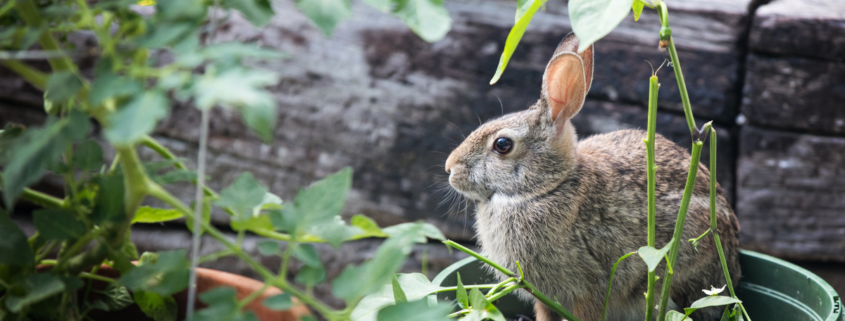

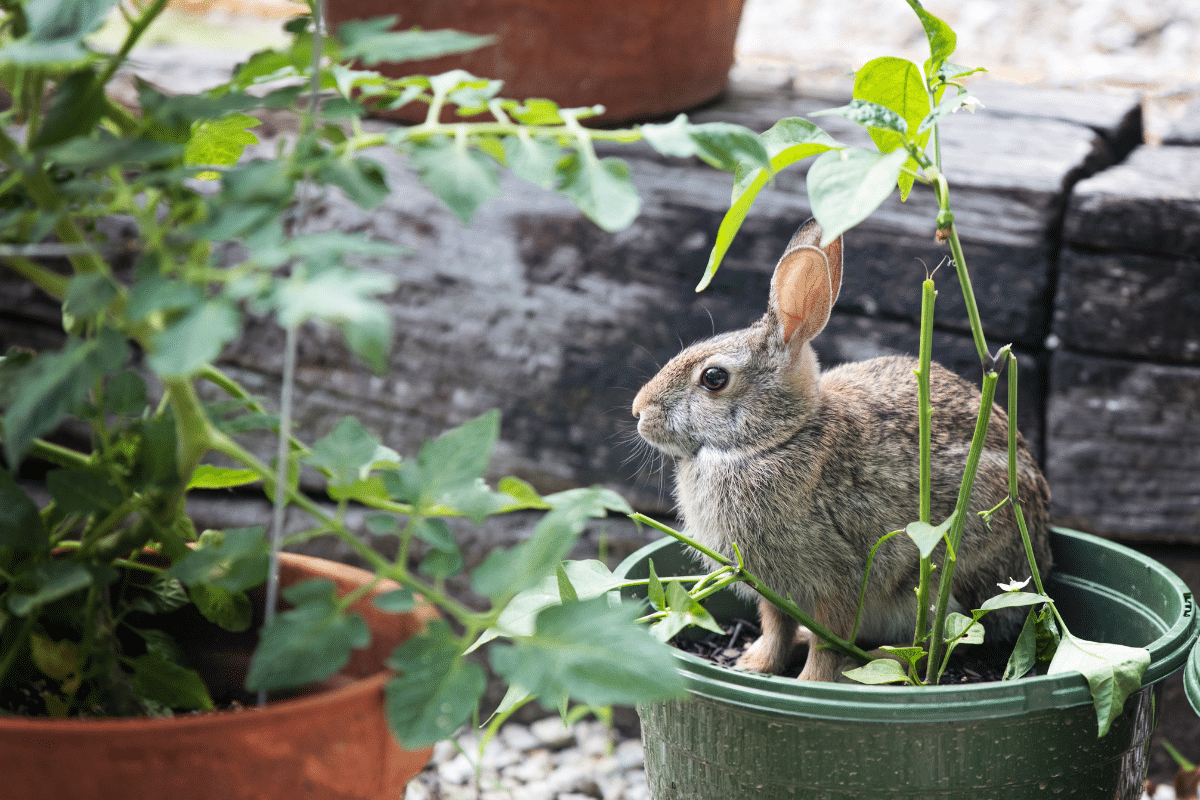
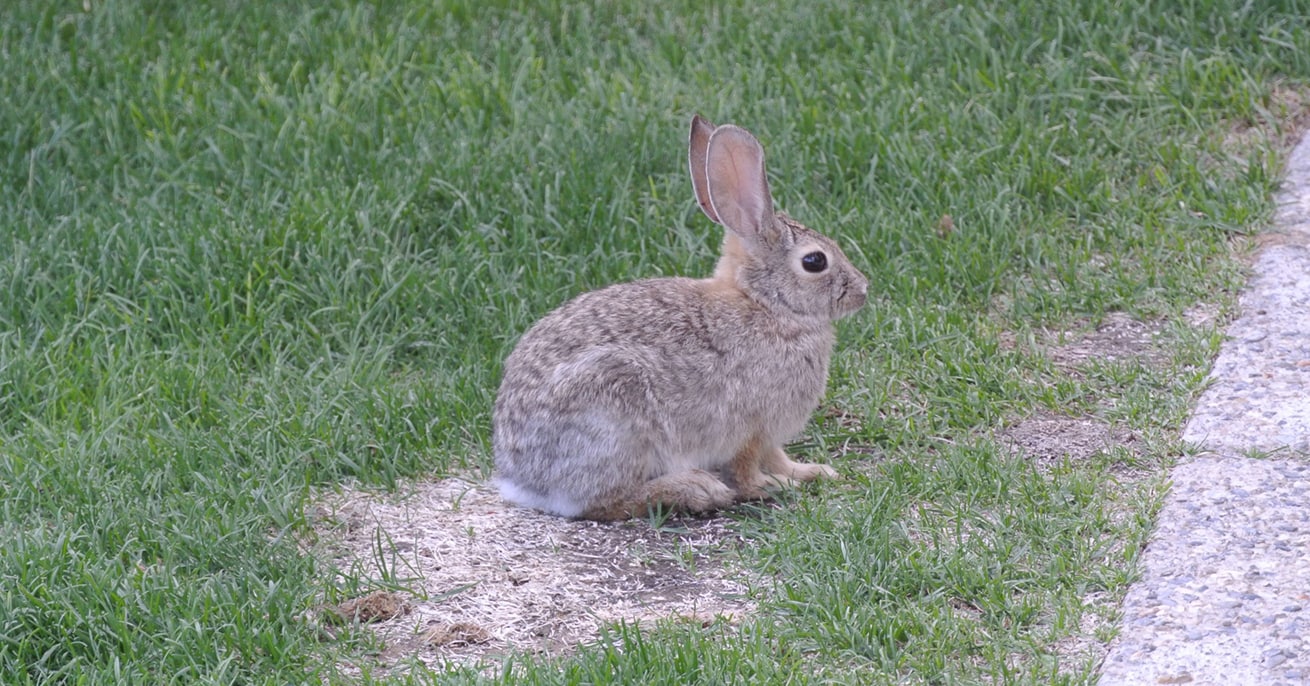
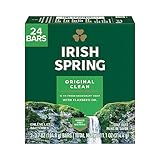








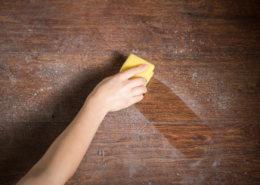






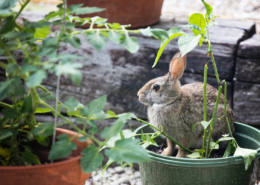



I would not recommend using blood meal or bone meal. Some dogs will go after both (the smell, and the bone meal or blood meal itself), my dog & a friend’s dog did. I’d put some of both around the base of a few rosebushes, both dogs (on separate occasions) dug around the rosebush to get at those two substances, chewed on the soil around the rosebushes. I believe blood meal also attracts rats, there are rats (tree rats the exterminator calls them) in my neighborhood, probably much of the town, and one spring, my veg garden was dug up repeatedly until I stopped using blood meal mixed in w/other fertilizer–I was using a row cover to start the plants earlier & protect them from cabbage moths, the row cover material was torn up too. I didn’t have a dog by then, and my yard is fenced well enough to keep out dogs.
Does the Irish Spring deterrent work in California? Will the sprinkler system effect it’s (3 to 4 times a week) efficiency ?
I can’t think of any reason it would not work in California! Water, whether from rain or sprinklers, will of course wash away a bar or chunks of soap. However, my experience is that even so, Irish Spring remains effective until it is completely washed away. It’s harmless to vegetation including grass, as far as I can tell. And for the places I use grated Irish Spring, it disappears much more quickly in the presence of water.
Thanks Mary, I’ll give it a try and let you know how it works
Any idea whether the Irish Spring method would repel squirrels? We tried mixing a LOT of cayenne pepper in with the bird seed in the bird feeders, but it didn’t bother them. And no matter where we hang the feeders, they find a way to get to them!
Pellet gun method works great.
Ha Ha. Might be an option if I had the time to sit out there all day. We used to have 4 dogs and that kept them away pretty well. We are down to 1 dog now and she’s pretty old so they’re not too scared of her. But once in a while she will stalk and kill one, then bring her gift to me. Not bad for an old girl!
Irish spring IS affective to deter squirrels. 3 small bundles of cheesecloth with soap cubes kept them from digging in my barrel planter last year. Ist time I didn’t need to replant dug up plants.
Are any of these solutions detrimental to lizards? I love seeing them in my garden and know they help against bugs. I will be trying some of these, as I have bunnies, deer, antelope and occasionally javalina.
This totally works!! We farm and at the first sight or scent
of a skunk, we cut up large chunks of Irish Spring and place them in the garden and corrals.
M.A. When it rains and there is a runoff of soap that gets into the soil of your garden does it not affect the flowers or vegetation
Small amount of soap are often the ingredients in many homemade fertiiizers. So … in these small quantities? No problems at all. Bonus: Blue Dawn kills aphids, mealy bug and white flies!
Will any of these deter gophers?
Haven’t tested on gophers, but supposedly Irish Spring is effective against lots of small mammals … maybe even deer if that bar of soap is large enough! Let us know if you try on gophers and what your results are! Sure can’t hurt …
We have tied chunks of Irish Spring from our fruit trees to protect them from the plentiful deer. Seems to keep the deer at bay & saved what was left of our little apple crop last year.
I can attest to the fact that gophers are not deterred by irish spring soap, unfortunately
Neighbor has 4 generations of feral cats and a 5th generation near birth. What can we use to keep these cats from using the whole yard as a litter pan.?
Red pepper powder spread around just might do the trick! Cats are not at all fond of citrus … lemon peel, orange peel. I’d suggest you start trying all of these tips.
Cinnamon powder sprinkled, talking to owners, call police and show them poop all over and ask what to do.
Try a pellet gun.
Will these suggestions work to deter groundhogs as well?
i just purchased coyote urine for the groundhogs, someone told me it will keep out
everything in my yard . I hope they are right! i got it online at Predators.com
Has anyone else experienced this? My expensive coir doormat has been totally chewed up by rabbits coming up to my front porch and eating the choir fibers. I am wondering which of these solutions to try that won’t involve someone wiping their feet on the doormat and then bringing the residue into the house.
I’d try ‘hiding’ the Irish Spring in some decorative pots around your front door, Lida. Good luck! I’m hoping to try that remedy myself. My rabbits have just been eating the flowers at my front door. 🙁 THANK YOU MARY! You are so good at discovering our ‘problems’ and then offering solutions! 🙂